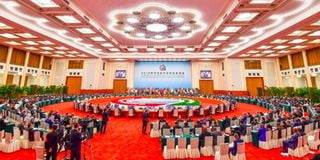Premium
China comes through for Africa in pandemic fight

A gathering of African Heads of State and Government at a High Level meeting during the Forum on China-Africa Cooperation (FOCAC) 2018 Summit in Beijing, China.
The 8th ministerial conference of the Forum on China Africa Cooperation (FOCAC) has concluded in Dakar, Senegal with a clear demonstration of longstanding commitment and the mutually reinforcing drive to strengthen ties between Beijing and the continent.
While the Covid-19 pandemic stopped most African and Chinese officials from traveling to Senegal for the triennial event, the global health crisis became a rallying force for targeted FOCAC partnership.
The announcement by President Xi Jinping that China will send one billion doses of Covid-19 vaccines to Africa stands in stark contrast to what we have seen recently with the discovery of the highly transmissible and deadly omicron variant in Southern Africa. As European countries and the United States rushed to slap travel bans on affected African countries, China has come forth with a bag of vaccines.
The World Health Organization has since classified omicron as a variant of concern while African leaders and institutions have decried low vaccines access, as a result of vaccine nationalism by producing countries. Only one in four health workers in Africa have been fully vaccinated according to the WHO while the continent’s overall inoculation rate stands below 7per cent; ten times less than those of high income countries.
Solid support
China’s vaccine assistance is therefore a shot in the arm for the African Union’s target to inoculate 60 per cent of Africa’s population by 2022. The gesture is a strong show of international synergy to upstage the pandemic and a continuation of solid support that Beijing has extended to Africa since the onset of the pandemic.
Previously, China shipped tonnes of medical supplies to Africa besides sending medical personnel to assist with on ground response. The move to co-produce 400 million of the pledged vaccines doses in the continent will also contribute to industrialization, job creation and Africa’s health systems strengthening.
China-Africa cooperation is however not an advent of the pandemic era. Long before the global health crisis, Beijing had been a strong partner for Africa’s development bid, contributing over 20 per cent to the continent’s economic growth in the last decade.
For 12 years in a row, China is Africa’s largest trade partner. To correct the prevailing trade imbalances, President Xi announced additional measures that will ensure more African products gain entry into the Chinese market.
Rwanda has set a good example for African countries on the use of digital platforms and targeted marketing to accelerate agricultural produce exports to China. In the next five years, Rwandan farmers will export fifty thousand tonnes of dried chilli valued at US$ 500 million to China.
Trade in agricultural produce promises huge potential in lifting the continent out of poverty and chronic food insecurity. Taking African stores to China through technology will afford Chinese consumers variety and quality while also expanding market choices for African products away from the traditional partners.
Africa has also come under heavy strain from the deepening climate crisis with the first climate famine currently unfolding in Madagascar. The green development support for Africa including establishment of centers of excellence for low-carbon (solar & wind energy) will foster climate-resilient development in Africa. China is already Africa’s lead partner in the green energy switch.
According to the International Renewable Energy Agency, between 2009 and 2018, China upgraded solar capacity in Africa from 739 to 5,500 Megawatts while wind energy installations during the same period jumped from a paltry 108 to 6, 100 Megawatts.
Job creation
This year’s FOCAC Ministerial conference has equally proven its utility in promoting closer economic collaboration between China and Africa. The inclusion of private sector partnerships with a 10 billion dollar credit line will spur job creation in Africa by building on the strong infrastructure outcomes of the previous FOCAC summits. Chinese firms have shown a willingness to invest in Africa with a combined foreign direct investment portfolio of US$ 43 billion by the end of 2020.
Many Africans worry about economic recovery prospects from the pandemic. Jobs have been lost and livelihoods destroyed. International financial markets have remained jittery about investing in the continent.
As the first country to return to economic growth after being hit by the pandemic, China has played a key role in global economic stabilisation. China’s decision to make available over 10 billion dollars to Africa’s financial institutions will significantly close the much needed funding gap in the continent.
China-Africa cooperation has weathered many challenges including toxic rhetoric and disinformation from quarters uncomfortable with the gains of the partnership.
Promotion of closer people to people ties through new initiatives like youth forum, women organisations and creative arts exchanges will further bridge the cultural divide and cement amity between Africa and Chinese nationals.
Twitter: @Cavinceworld.





